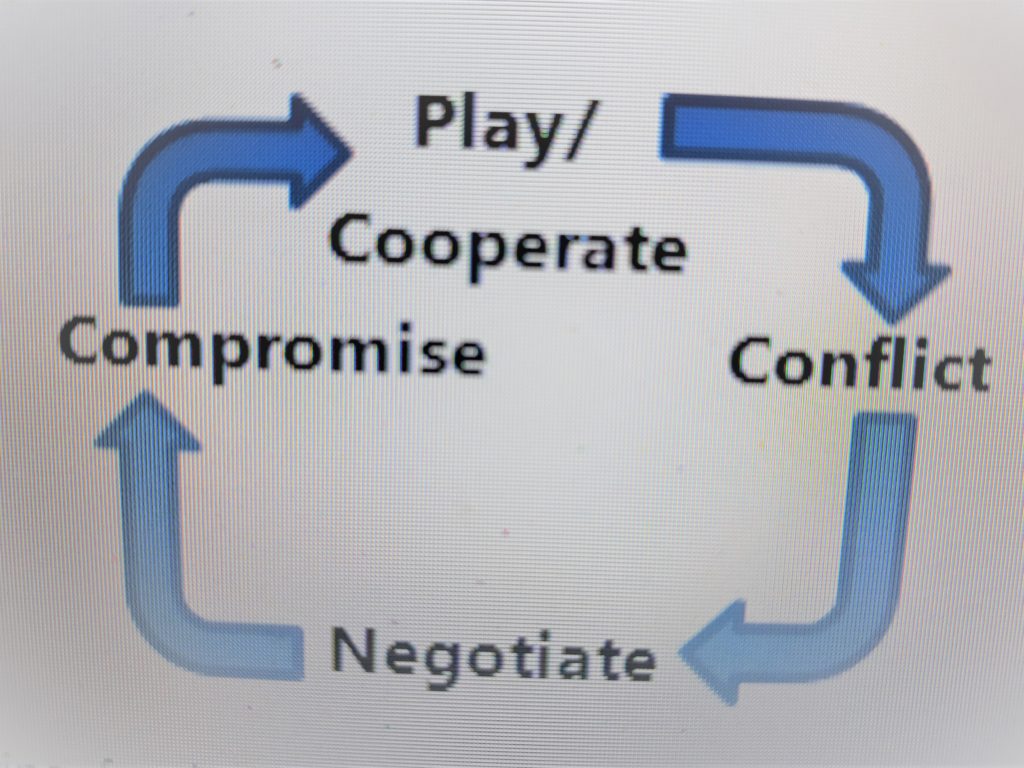Have a look at the diagram below in respect of small children playing:

If we adults watch children playing we will notice that a lot of the time is spent negotiating when some conflict arises during the play. When we observe this conflict, we may be tempted to interfere and sort it out. But almost always children find a compromise that is acceptable to all so that they can resume play.
The reasons why we are tempted to interfere could be because 1): we make a judgement about what is worth arguing about and what isn’t, 2): we see a stronger child dominating and we want the play to be fair, 3): we don’t want them to waste time arguing when they could be playing – because we might have to call them in to do their homework soon, 4): we just get fed up listening to them arguing, or 5): (tricky one – this) their conflict induces unconscious unpleasant memories in ourselves that we are not aware of – and we want to get rid of the memories quickly.
But actually – the arguing, crying, laughing, having little tantrums, walking away and coming back, refusing to follow orders, pussing, and all the other behaviours that go with the negotiating are invaluable life lessons that are being learned through play – and only play – with no adult interference.
Children are playing with their emotions, learning to bargain and barter, make a deal, be empathic to own and others’ needs, and through it all find a middle ground that they are happy with.
You will see that in the diagram above I have placed play beside cooperate. This is because play is the ultimate in cooperation. In fact, we cannot play if we don’t cooperate. This is particularly true of play where there are no formal rules, as is the case with very young children.
And play is at the growth edge of children’s education in that they instinctively know what they need to know as adults. My children grew up at the dawn of the computer age. I always thought it interesting that they figured out how to get the most out of computer technology faster than me. Firstly they didn’t have the fear-of-getting-it-wrong that I had, secondly, they approached it with a playful curiosity, and thirdly – maybe – they realised at some unconscious level that they would need to be familiar with such technology if they were to prosper as adults.
When the rules are made up as we go along, if a compromise situation is not reachable, and others can’t or won’t cooperate, the play is over.
I believe that the fact that children playing when left alone are almost always able to reach a compromise so that the play can continue is a very strong indication of our innate need to play.
As an aside – and I don’t know whether this is a personal observation or if it’s generally true – I find that people who are very serious (and/or have a fixed idea of what play is) find it more difficult to cooperate or reach agreement with others than those who have a playfulness about them and don’t take life so seriously.
Fast forward to teenage years and we find the same thing when slagging is going on in a peer group. If the slagging gets too severe, personal or insulting there is the risk that the person who is in the firing line (so to speak) leaves the group so the fun is over.
I have often observed teenagers (and I remember from my own teenage years) going to the brink of acceptability but not crossing it because then the fun goes out of it. Of course, unlike little children, teenagers have been exposed to games with formal rules and the win-at-all-costs competitive world of school and organised sports for 10-12 years, so very often the fun is in the getting rid of one of the group that is uncool or unwanted.
But that is not what I call playful at all!
